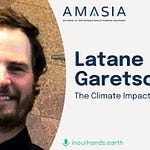In this episode from our archives, Ramanan speaks with Tim Lenton, Professor of Climate Change and Earth System Science at the University of Exeter and Director of the Global Systems Institute.
Lenton has over 20 years of research experience in studying the Earth as a system, and developing and using models to understand its behavior. He is particularly interested in how life has reshaped the planet in the past, and what lessons we can draw from this as we proceed to reshape the planet now.
These topics are covered in his books Earth System Science: A Very Short Introduction (2016) and (with Andrew Watson) Revolutions That Made The Earth (2011). Dr. Lenton leads the University of Exeter’s Climate Change MOOC (Massive Open Online Course), which has attracted over 60,000 learners worldwide since its launch in 2014. He obtained his BA in natural sciences from Robinson College, Cambridge in 1994 and completed his PhD under Andrew Watson at the University of East Anglia in 1998.
In this conversation, they discuss the Gaia hypothesis, tipping points, and human intervention in climate systems.
Full transcript available above. This episode is also available on Apple Podcasts and Spotify.
In Our Hands is a production of Amasia. Follow these links for more about our firm, the Amasia blog, our climate fiction podcast, and Ramanan’s blog.
Highlights
[00:19:37] Earth System Science and Sustainable Development
[00:24:38] Human Intervention in Climate Systems












